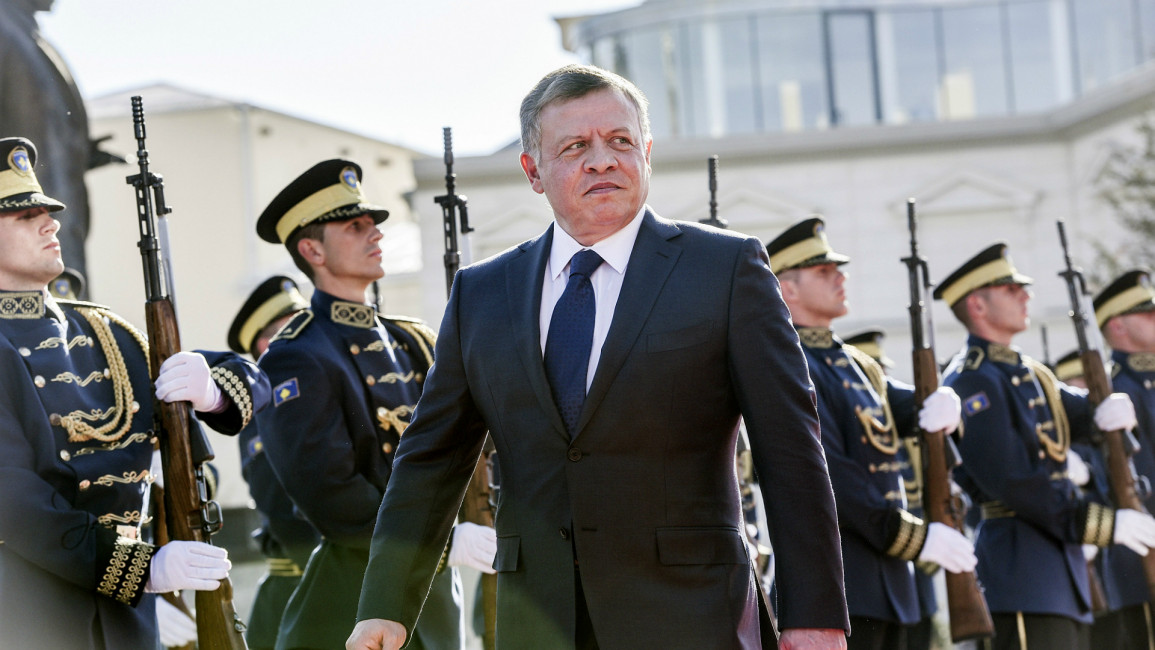Jordan's king granted new powers by parliament in latest constitutional amendment
Jordan's parliament gave King Abdullah II sweeping new powers to appoint and dismiss officials on Monday after approving an amendment to the country's constitution.
MPs overwhelmingly voted to amend Article 40 of the constitution, giving the Jordanian monarch the ability to appoint and dismiss the Chief Justice, head of the Sharia Judicial Council, Grand Mufti, Chief of the Royal Court, Minister of the Court, and the king’s advisors.
Only seven MPs (out of 130) voted against the measure, most of them from the Muslim Brotherhood-associated Islah political bloc.
Jordan’s constitution already gives the king considerable powers, allowing him to control who becomes prime minister, as well as the heads of the military and the intelligence agency.
He also appoints every member of the parliament's upper house and can dissolve the parliament at will.
Prime Minister Bisher Khasawneh told parliament on Monday that these amendments were constitutional and aimed at "distanc[ing] these posts from partisan bickering to preserve bickering to preserve their impartiality".
Mohammed Abu Sal'ilik, an Islah MP who voted against the change, told The New Arab that the amendment was a move towards "absolute monarchy without naming it as such".
"This is transferring the powers of the government and the power of parliamentary oversight to the king. All of the effective tools and bodies will be in the hands of the king," Abu Sal'ilik said.
"It would be preferable if our classification was clear: Either we are a true parliamentary government, or we are an absolute monarchy, and we move forward with it."
Another MP, Wasfi Al-Rawashde, commented sarcastically that "all that remains for the government is to announce the change of time in summer and winter".
Jordan's parliament is currently voting on a number of different constitutional amendments, from more gender-sensitive language in the constitution to election laws.
Some of the amendments stem from recommendations made by the "Political Modernisation Committee", a body tasked by the king over the summer with "modernising" Jordan's political system.
Other amendments, such as the change to Article 40, were put forth by the government itself.
On Sunday, MPs voted down an amendment that would have placed the king at the head of a "National Security Council", meant to dictate domestic and foreign policy.
The head of the constitutional reform committee, Ahmad Tabeshat, said that the king's powers as the head of the executive branch already include the powers of the proposed council.
Jordan has a bicameral parliament led by a prime minister, though its powers are limited in scope when compared to the king's authority.
King Abdullah has frequently dismissed ministers and prime ministers in response to domestic crises over the last decade.
The purpose of the Political Modernisation Committee and its recommendations was to move Jordan closer to a parliamentary monarchy and to strengthen its electoral system, some analysts have said.
At the inauguration of the latest parliamentary session in November, King Abdullah told MPs that they "bear the responsibility of debating and endorsing … the proposed constitutional amendments".



